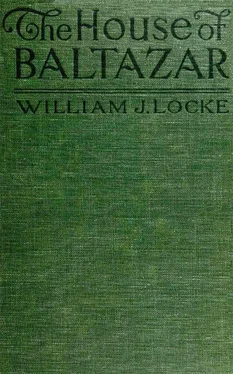“My God,” said the young man, “how you must have loved him!”
“Without loving him, any fool could have looked through his transparent honesty. He was that kind of man.”
“Tell me,” he said, “all the little silly things you can remember about him.”
He re-explained his eagerness. He had been such a lonely sort of fellow, with no kith or kin with whom he could be in sympathy: an intellectual Ishmaelite—if an inexplicable passion for mathematics and a general sort of craving for the solution of all sorts of problems, human and divine, could be called intellectual—banned by the material, dogmatic, money-obsessed Woodcotts; referred back, as he had mentioned, for all his darling idiosyncrasies to his unmentionable father. Small wonder that he had built up a sort of cult of the only being who might have taken for him a sympathetic responsibility. And now—this was the greatest day of his life. All his dreams had come true. He was not a sentimental ass, he reasserted. If there was one idiot fallacy that the modern world was exploding, it was the fallacy of the debt due by children for the privilege they owed their parents for bringing them into this damned fool of a world. The only decent attitude of parents towards their children was one of profound apology. It was up to the children to accept it according to the measure of its fulfilment. But, after all, an uncared-for human atom, with intelligence and emotions, could not go through life without stretching out tentacles for some sort of sympathy and understanding. He must owe something of Himself—himself with a capital H—to those who begot and bore him. Mustn’t he? So when they impressed on his young mind, by way almost of an hereditary curse, the identity of his spiritual (or, to their way of thinking, anti-spiritual) outlook with that of his father, he, naturally, stretched out to his unknown father the aforesaid tentacles: especially when he learned later what a great man his father was. Yes, really, he considered it the most miraculous day of his life. He would have given another foot to have it.
“There’s another thing,” he said. “Once I found in an old book some odds and ends of his manuscript. I fell to copying his writing, especially his signature. The idiotic thing a boy would do. I got into the trick of it, and I suppose I’ve never got out. Look.”
He scrawled a few words with his signature on the pad. She started. It was like a message from the dead. He laughed and went on with the parable of his father.
“You see,” he concluded, “it is gorgeous to know, for a certainty at last, that the Family were vilely wrong, and my own instinct right, all the time.”
He had spoken with a touch of the vehemence she so well remembered. And she had let him speak on, for the sake of the memories; also in the hope that he might forget his demand for a revelation of them. But he returned to it.
“Another day,” she replied. “These things can’t all be dragged at once out of the past. We’ll have many opportunities of talking—till your new foot comes.”
“You will have another talk—many others, won’t you?” he asked eagerly.
“Why should you doubt it?”
“I don’t know. Forgive me for saying it—I don’t want to be rude, but women are funny sometimes.”
She smiled from the wisdom of her superior age—his frankness had the disarming quality of a child. “What do you know of women, Godfrey Baltazar?”
He wrinkled his brow whimsically and rubbed his hair.
“Not much. What man does? Do you know,” he asked with the air of a pioneer of thought, “you are all damnably perplexing?”
At this she laughed outright. “Isn’t she kind?”
“She—who—oh, yes. How did you guess?”
“The way of Nature varies very little. What about her?”
“She would be all right, if it weren’t for my brother——”
“Your brother? Oh, of course——” She had to reach back into unimportant memories. “Your mother was a widow when she married—with an only son.”
“That’s it. Seven or eight years older than I am. Name of Doon. Christened Leopold. We never hit it off. I’ve loathed the beggar all my life; but he’s a damn fine soldier. Major. D.S.O. Doing splendid work. But the brute has the whole of himself left and isn’t a dot and carry one, like me.”
“And the lady?”
“I’ll tell you another time—in one of our many talks. At present it doesn’t seem to amount to a row of pins compared with my meeting you. My hat!” he exclaimed after a pause. “It’s a funny little world.”
He thrust his hands into his pockets and stretched out his legs, the end of the maimed one supported on the crutch. The afternoon peace of the beech wood enfolded them in their contemplation of the funny little world. She looked at him, young, strong, full of the delight of physical and intellectual life, reckoning as of no account the sacrifice to his country of much that made that physical existence full of precious meaning; hiding deep in his English soul all the significance of his familiar contempt for death; a son whom any mother might be proud to have brought into the world. And tears were very near her eyes when she thought of what might have been. And all her heart went out to him suddenly in a great gush of emotion, as though she had found her own son, and the tears started. She laid rather a timid hand on his shoulder.
“My dear,” she said, “let us be great friends for the sake of the bond between us.”
He started at her touch, and plucking both hands from his pockets, imprisoned hers in them.
“Friends! You’re a dear. The dearest thing in the world. You’re going to be the only woman I’ve ever loved. Why, you’re crying!”
Her wet eyes glistened. “We’re all hopelessly perplexing, aren’t we?”
“You’re not. Not a little bit.” He kissed her hand and let it go. “You’re straight and adorable. But what can I call you?”
“Call me?” The question was a little shock. “You can call me by my name, if you like—when we are alone—Marcelle.”
“Splendid!” he cried. “The long-felt want. I’ve had as many Sisters as my young life can stand.”
She rose, helped him to rise.
“I hope,” she said, “you will remain the boy that you are for a very long time.”
AFTER this they had the many talks which they had promised themselves, and she told him the little things about John Baltazar which he had craved to learn. And the young man told her of his ambitions and his hopes and his young despairs. The last mainly concerned one Dorothy Mackworth, a Warwickshire divinity in a silk tennis sweater and tam-o’-shanter, whose only imperfection, if the word could be applied to tragic misfortune, was her domination by some diabolic sorcery which made her look more kindly on the black Leopold, his brother, than on himself. Her age? Seventeen. “You poor babies,” thought Marcelle. Once she said:
“Why worry? You can find a thousand little Dorothys in a week if you look for them—all a-growing and a-blowing, with never a wicked spell on them at all.”
“You are wrong,” he replied. “One can find thousands of Susans and Janes and Gertrudes—all very charming girls, I admit; but there’s only one Dorothy. She’s very remarkable. She has an intellect. She has a distracting quality, something uncanny, you know, in her perceptions and intuitions. I’m dead serious, Marcelle, believe me——”
She let him talk his heart out. Her soul, dry and athirst, drank in his boy’s freshness—how greedily she scarcely realized. In her character of nurse she had acted as Mother Confessor to many a poor lonely wretch; but in every case she had felt it was to the nun-descended uniform she wore, to its subconsciously recognized sanctity, and not to the mere kindly woman beneath, that she owed the appeal or the revelation. But now to young Godfrey Baltazar she was intensely, materially woman. Foolishly woman in her unconfessed craving to learn the details of his life and character and outlook on the world.
Читать дальше












